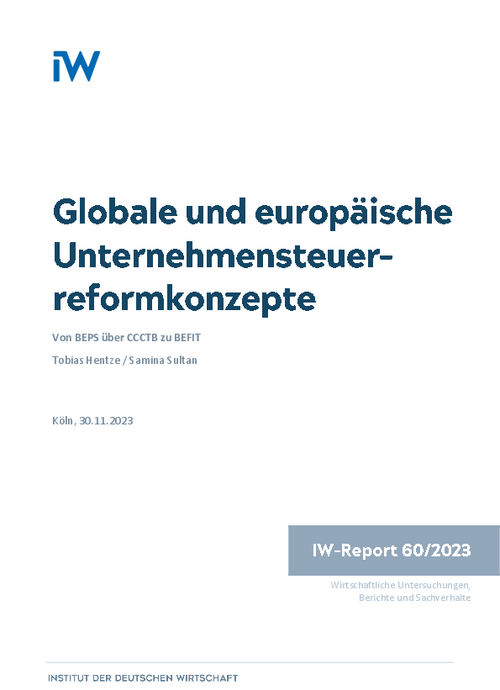The harmonization of corporate taxation at an international level has been on the political agenda for many years. Both the Organization for Economic Cooperation and Development (OECD) and the European Commission have presented reform projects in this regard, which are now awaiting political implementation.

Global and European corporate tax reform concepts

The harmonization of corporate taxation at an international level has been on the political agenda for many years. Both the Organization for Economic Cooperation and Development (OECD) and the European Commission have presented reform projects in this regard, which are now awaiting political implementation.
The OECD's inclusive framework is based on two pillars. While the first pillar provides for a formula-based distribution of profits for the fair distribution of taxing rights, the second pillar is primarily concerned with a global effective minimum tax. However, the OECD initiative has so far failed to reach an agreement on a harmonized assessment basis. This could hamper its success. The European Commission's proposal to introduce BEFIT ("Business in Europe: Framework for Income Taxation"), a common set of rules for calculating the tax base for companies in the EU and to distribute profits between the European member states on a formula-based basis in the long term, therefore represents the necessary second step to ensure fairness, at least within the European Union (EU). The BEFIT concept takes up elements of earlier initiatives at European level and is based on the OECD's two-pillar concept. Firstly, international accounting standards are to be used to calculate the tax base for both Pillar 2 and BEFIT. Secondly, a formula-based profit distribution is to be used in Pillar 1, which is also envisioned in the longer-term concept of BEFIT The two reform concepts are thus closely interwoven in their systematics and logic. This approach is to be welcomed, as it helps to limit compliance costs.
In summary, the reform plans of the OECD and the European Commission are designed to be pragmatic, although higher compliance costs for companies are possible in some cases. In the long term, Pillar 1 is intended to reallocate tax rights at international level, at least for the largest companies. Pillar 2 introduces a moderate lower limit to tax competition. In contrast to previous attempts, the European Commission is initially foregoing a formal-based allocation of the tax base to the participating countries in BEFIT in order to increase political acceptance. Instead, BEFIT focuses on uniform rules for determining the tax base in the respective member states and cross-border consolidation of profits and losses during the planned transition phase. However, the fact that it will still be possible to make relevant adjustments to the tax base at national level tends to counteract the objectives. If the uniform rules and the possibility of offsetting losses prove their worth in practice and find acceptance in the transitional phase, the question of a redistribution of taxation rights will arise. From an economic point of view, it would be appropriate and essential to reduce compliance costs by allocating the entire tax base according to a formula-based allocation key. However, the reduction in tax revenue would probably be serious, particularly for smaller member states. It is possible that the minimum tax could lead to additional revenue in the countries concerned and partially offset the effect.
Due to the focus on a small number of companies (Pillar 1), a design of the minimum tax that makes behavioural adjustments in countries with a lower tax rate than 15 percent attractive (Pillar 2) and the temporary waiver of a redistribution of the tax base under BEFIT, the effects on tax revenue due to the reform concepts are estimated to be low. For example, additional tax revenue of EUR 4 to 8 billion per year is expected for Germany due to the OECD’s inclusive framework, which corresponds to less than 1% of total tax revenue.

Global and European corporate tax reform concepts

More on the topic
Not so Different?: Dependency of the German and Italian Industry on China Intermediate Inputs
On average the German and Italian industry display a very similar intermediate input dependence on China, whether accounting for domestic inputs or not.
IW
China’s Trade Surplus – Implications for the World and for Europe
China’s merchandise trade surplus has reached an all-time high and is likely to rise further. A key driver appears to be a policy push to further bolster Chinese domestic manufacturing production, implying the danger of significant overcapacities.
IW